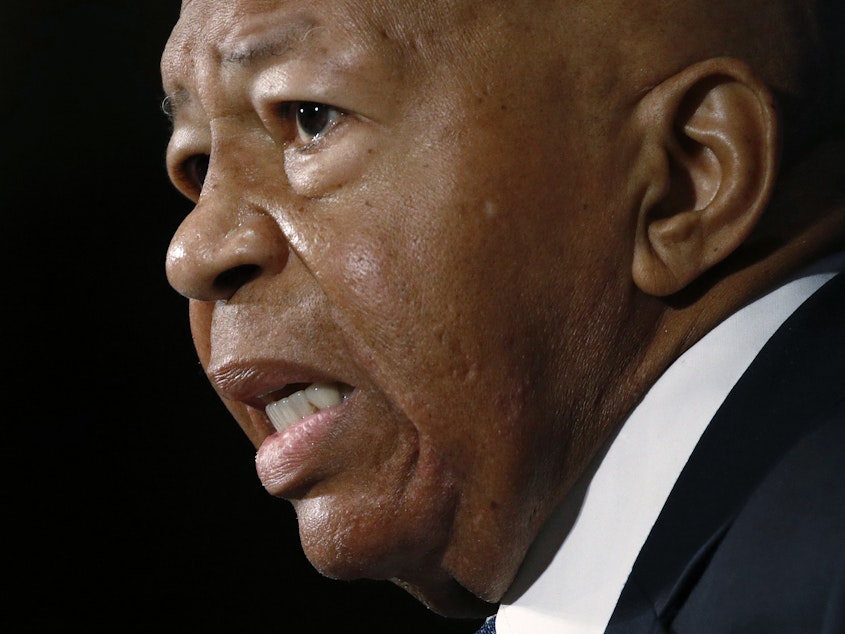Maryland Democratic Rep. Elijah Cummings Dies At 68

Updated at 9:50 a.m. ET
Rep. Elijah E. Cummings, a Baltimore attorney and civil rights advocate who served in Maryland's legislature before representing the state in the U.S. House, where he took on a lead role in investigating President Trump, has died. He was 68.
Cummings, the head of the powerful House Committee on Oversight and Reform, died early Thursday at Johns Hopkins Hospital from complications related to longstanding health challenges, according to The Associated Press.
President Trump issued a statement via Twitter saying:
"My warmest condolences to the family and many friends of Congressman Elijah Cummings. I got to see first hand the strength, passion and wisdom of this highly respected political leader. His work and voice on so many fronts will be very hard, if not impossible, to replace!"
Sponsored
The 12-term congressman had failed to return from an unspecified medical procedure and missed two legislative roll call votes on Tuesday, the first day after a two-week recess, according to The Baltimore Sun.
In a statement on Sept. 30, Cummings said his doctors expected him to be able to return to Washington "when the House comes back into session in two weeks." It said he'd be in "constant communication" with his staff and congressional colleagues while he was away.
Cummings was among the three Democratic committee chairmen who signed a letter last month that accompanied a congressional subpoena of Secretary of State Mike Pompeo, who has declined to testify in the ongoing impeachment inquiry of the president.
According to an official biography of Cummings, the Baltimore native attended Howard University, where he obtained a bachelor's degree in political science and served as student government president. He later obtained a law degree from the University of Maryland School of Law.
He served for 13 years in Maryland's House of Delegates before winning his congressional seat in 1996.
Sponsored
"Congressman Cummings has dedicated his life of service to uplifting and empowering the people he is sworn to represent," his official biography says.
"He began his career of public service in the Maryland House of Delegates, where he served for 14 years and became the first African American in Maryland history to be named Speaker Pro Tem," it says. "Since 1996, Congressman Cummings has proudly represented Maryland's 7th Congressional District in the U.S. House of Representatives."
Cummings was born and raised in Baltimore and lived there his entire life in what he described as the "inner inner city." He was one of seven children of parents who worked as sharecroppers before moving to the city in the 1940s, according to the Sun.
Discussing Cummings' connection with his constituents in Baltimore, Sherrilyn Ifill, president of the NAACP Legal Defense and Educational Fund, tells NPR's Noel King, "he really was a moral force in the community."
"People trusted him in the unrest after Freddie Gray was killed — it was Elijah Cummings who could walk into the crowd and be recognized and have people respond to him," Ifill says. "And so I think what the country has seen of him over the last year is a reflection of what many of us here in Baltimore have known for the 20 years of his leadership. A man of tremendous, tremendous integrity."
Sponsored
As a prominent Democratic lawmaker, Cummings frequently found himself on the receiving end of Trump's Twitter account. In an infamous series of tweets in July, the president referred to Cummings' Baltimore district as "rat and rodent infested" and suggested that the congressman seldom goes there.
"Mr. President, I go home to my district daily," Cummings fired back in a letter to Trump. "Each morning, I wake up, and I go and fight for my neighbors."
Referring to investigations of the president, which he perceived as the true impetus for the derogatory remarks, Cummings said in the letter that it is "my constitutional duty to conduct oversight of the Executive Branch. But it is my moral duty to fight for my constituents."
Despite the president's remarks, Cummings continued to reach out to the White House and called on government officials to stop making "hateful, incendiary comments" that divide and distract.
When Democrats took the House in the 2018 election, political pundits had predicted that Cummings' chairmanship of the Oversight Committee would be a "nightmare" for Trump.
Sponsored
"Are we going to be the nightmare? he mused in an interview with the Sun. "It's in the eye of the beholder."
NPR's Casey Noenickx contributed to this report. [Copyright 2019 NPR]



